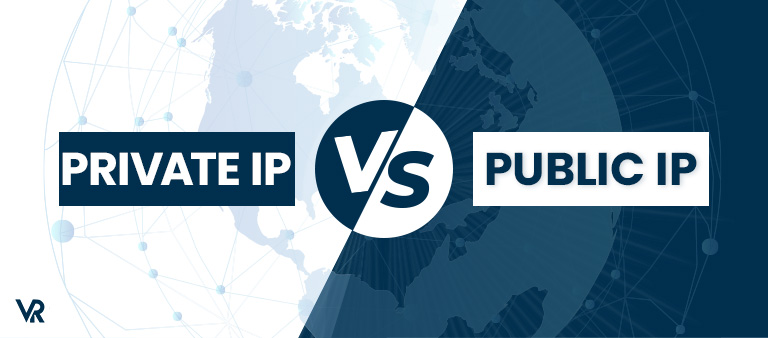Public and private IP addresses are two significant parts of the online identity of your device that most users hardly ever think of. But due to a paradigm shift in how people work nowadays, mainly due to the pandemic, work-from-home has been prevailing among employees.
With the increase in the activities on the internet, cybercrime has also seen a surge. Now, it has become more significant to understand the function of the IP address of your device and how it can disclose your identity on the internet.
Before we proceed further into our public vs. private IP address differentiation, let’s converse about an IP address in a broad spectrum. Reconnect to the Wi-Fi and check your Spectrum Router IP address again to see if you can log in.
Every device which is connected to the internet is assigned an exclusive numerical identifier that is called an IP address. Through these IP addresses, the devices connected to the internet communicate with the websites and other devices on the network. These IP addresses act as mailing addresses of your device, but for internet use.
Public vs Private IP Address Range in USA– Side-by-Side Comparison of Key Features
To know about the Private vs Public IP addresses, check out our quick comparison of the two:
| Public IP Address | Private IP Address |
|---|---|
| Used for communicating over the internet outside the private network | Used for communicating within your private network |
| External/global reach | Internal/local reach |
| Easily found by searching on the internet by typing What is my IP address? Or through command prompt on PCs | Found through the internal settings of your device |
| Not Free | Free |
| Assigned and managed by your ISPs | Assigned to your specific device through a router within a private network |
| An exclusive numeric code only assigned to your device | A generic code that may be reused by other devices connected to any other private network |
| Any number not included in the reserved private IP address range
Example: 8.8.8.8. |
10.0.0.0 — 10.255.255.255;
172.16.0.0 — 172.31.255.255; 192.168.0.0 — 192.168.255.255. Example: 10.11.12.13 |
| Public IP addresses are routable | Private IP addresses are not routable |
What Does a Public IP Address Mean?
A public IP address is an IPv4 address that is retrieved directly over the internet and is allocated to the router of your network by an Internet Service Providers (ISPs). A resource that requires being reachable in your tenancy on the internet should have a public IP address.
Connecting to the Internet using a public IP address is similar to using a mailbox, a lot safer but vividly noticeable.
Want to know how you can change your public IP address? Click here to find out!
Why should I hide my public IP address in USA?
You may want to hide your IP address for a variety of reasons. Some are:
- Protecting your online privacy.
- Protection from hackers.
- Use public Wi-Fi safely.
- Access geo-restricted contents.
- To avoid govt. Censorship.
Public IP ranges
The public IP range encompasses every number not reserved in the private IP range. Usually, the list of public IP addresses ranges from 1 to 191.
What Does Private IP Address Mean?
What is a Private IP address? A private address is assigned to a device by a network router. Each device on the same network receives a unique private IP address (also known as a private network address). These addresses enable devices on the same internal network to communicate with each other without needing to connect to the global Internet.
That is by making it hard for external hosts or users to establish a connection, a private IP address helps to increase security in certain networks, such as your home or office.
What is a private IP address used for in USA?
A private IP address is majorly used within a private network in order to securely connect to other devices present within the same network. It often enhances network security.
What is a local IP address?
A local IP address is an alternate term for a private IP address. Devices connected to a Local Area Network (LAN) communicate with one another using local IP addresses – for example, when your router sends data to your PC or smartphone. Your router automatically allocates an IP address to every connected device.
How do Public and Private IP Addresses operate in USA?
To understand how public and private IP addresses work, here’s an analogy. Assume that you live in a building and want to send a candy box to your neighbour living upstairs flat no. 145. Since you already live in a building, you can simply write “House#145” on the package and drop it into the building mailbox. Your building mail staff will pick it up and simply deliver it to the house.
However, if you live outside the building and want to send a candy box to House#145’s owner, you cannot just write “House#145” on a package and drop it off in a standard mailbox. The postman wouldn’t know which building to deliver the package to, since there are many flats with the number 145.
Instead, you will have to address the package to the building’s address, including house number 145. If you don’t include the house number, then the postman can’t understand which flat should get the package. So, in this case, the building address is the public IP address example, while the flat number is the Private IP address example.
Private IP ranges
When discussing public vs. private IP address, it is also important to understand that there are thousands of private networks assigned all around the world, all of which include devices that are assigned a private IP address within these ranges. Here are some examples of private ipv4 address range:
- 10.0.0.0 — 10.255.255.255;
- 172.16.0.0 — 172.31.255.255;
- 192.168.0.0 — 192.168.255.255.
How to check my private IP address
- Go to Settings > click on Network and Internet.
- On the next window, select Status in the left pane. In the right pane, click on the Properties button for the active Network on your computer.
- On the Network Properties window, you will see your Private IP Address listed next to the iPv4 address entry.
Internal and external IP addresses
Internal IP addresses are assigned to the local network and exist so that routers (devices that connect to the Internet) can tell the difference when a computer, cell phone, printer, or other device is connected. While the external IP address is your router’s IP address, this is what websites see when you browse the web.
- IP Address vs Gateway : Unveiling the difference between IP Addresses and Gateways
- IP Address vs MAC Address : Decoding network difference between IP and MAC Addresses
- How to find IP Address on Mac: Discover Your Mac’s IP Address with These Easy Steps.
- How to find Comcast IP address: Easily Find Your Comcast IP Address with This Guide.
Public IP and Private IP in USA – FAQs
Is 192.168 private or public in USA?
It is one of the most common default private IP addresses format given to network routers all over the world. The range of numbers between 192.168.0.0 and 192.168.255.255 is reserved for private IP addresses. The Internet Assigned Numbers Authority distributes these numbers to router manufacturers.
Which is better private or public IP address in USA?
In terms of security, private IP addresses are way better than public IPs, since private IP addresses aren’t visible directly over the internet and are located behind NAT, which also ensures your home network’s security.
How do I host my website with public IP in USA?
For hosting websites with a public IP address in USA, you require using a dynamic DNS service that’s free such as no-ip.com, in which you can select a free domain name and point it towards your public IP address. You’d also have to add your credentials of no-ip.com and domain name in your dynamic DNS router settings.
What is my IPv4 address in USA?
Here is how you can find out your IPv4 address in USA:
- Open the Control panel and navigate to Network and Internet.
- Click on Network and Sharing Centre.
- Open the Change adapter settings the link, on the left.
- Double-click Ethernet.
- Click Detail, under the Connection section.
- Scroll down to find your IPv4 address.
How can I change my Private IP to a Public IP in USA?
If you want to change your public IP address in USA, opt for the following methods.
- Connect to a VPN to change your IP address.
- Use a proxy server.
- Use Tor to change your IP.
- Switch to a different network.
Conclusion
This article explains the difference between a private and a public IP address. Even though both of these IP address types are important for connecting to the internet, private and public IP address serves completely different purposes.
If you are willing to set up a small network at a small office or home, private IP addresses in USA are the best. On the contrary, if you wish for a network of broader coverage, then public IP addresses will be your best bet.
It is wise to use a VPN to hide both your public and private IP addresses in USA. You can also safeguard your internet usage by using public IP addresses using a VPN. However, should always opt for the best VPN service, instead of anyone the industry has to offer.
We hope you liked our public vs. private IP address in USAguide. Cheers!

